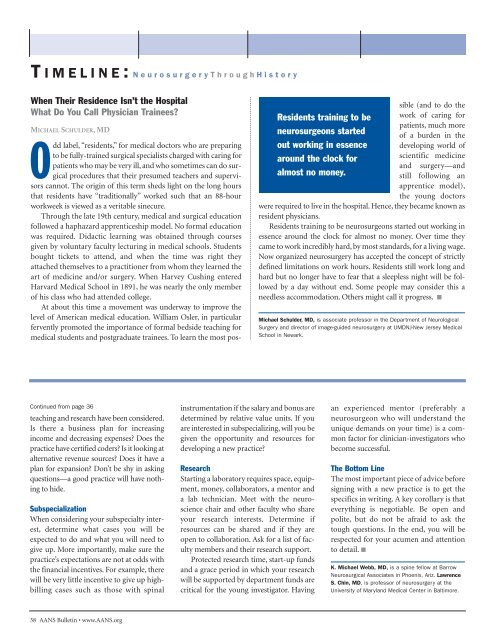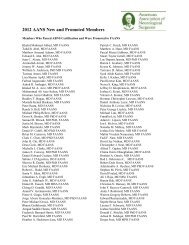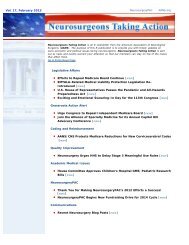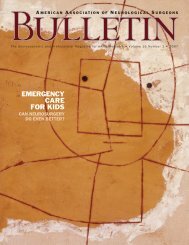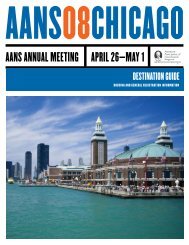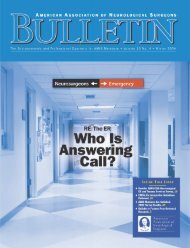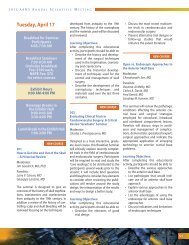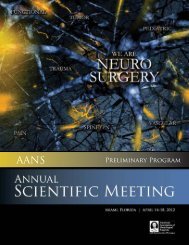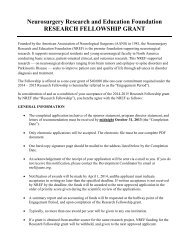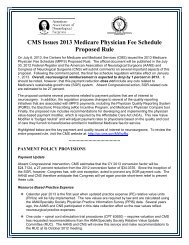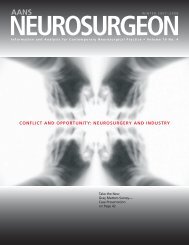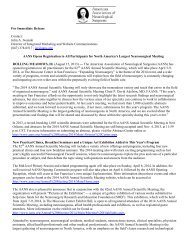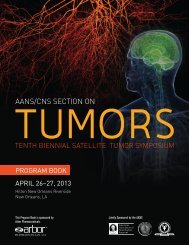view PDF - American Association of Neurological Surgeons
view PDF - American Association of Neurological Surgeons
view PDF - American Association of Neurological Surgeons
You also want an ePaper? Increase the reach of your titles
YUMPU automatically turns print PDFs into web optimized ePapers that Google loves.
T IMELINE: N eurosurgery Through History<br />
When Their Residence Isn’t the Hospital<br />
What Do You Call Physician Trainees<br />
MICHAEL SCHULDER,MD<br />
Odd label, “residents,” for medical doctors who are preparing<br />
to be fully-trained surgical specialists charged with caring for<br />
patients who may be very ill, and who sometimes can do surgical<br />
procedures that their presumed teachers and supervisors<br />
cannot. The origin <strong>of</strong> this term sheds light on the long hours<br />
that residents have “traditionally” worked such that an 88-hour<br />
workweek is <strong>view</strong>ed as a veritable sinecure.<br />
Through the late 19th century, medical and surgical education<br />
followed a haphazard apprenticeship model. No formal education<br />
was required. Didactic learning was obtained through courses<br />
given by voluntary faculty lecturing in medical schools. Students<br />
bought tickets to attend, and when the time was right they<br />
attached themselves to a practitioner from whom they learned the<br />
art <strong>of</strong> medicine and/or surgery. When Harvey Cushing entered<br />
Harvard Medical School in 1891, he was nearly the only member<br />
<strong>of</strong> his class who had attended college.<br />
At about this time a movement was underway to improve the<br />
level <strong>of</strong> <strong>American</strong> medical education. William Osler, in particular<br />
fervently promoted the importance <strong>of</strong> formal bedside teaching for<br />
medical students and postgraduate trainees. To learn the most pos-<br />
Residents training to be<br />
neurosurgeons started<br />
out working in essence<br />
around the clock for<br />
almost no money.<br />
sible (and to do the<br />
work <strong>of</strong> caring for<br />
patients, much more<br />
<strong>of</strong> a burden in the<br />
developing world <strong>of</strong><br />
scientific medicine<br />
and surgery—and<br />
still following an<br />
apprentice model),<br />
the young doctors<br />
were required to live in the hospital. Hence, they became known as<br />
resident physicians.<br />
Residents training to be neurosurgeons started out working in<br />
essence around the clock for almost no money. Over time they<br />
came to work incredibly hard, by most standards, for a living wage.<br />
Now organized neurosurgery has accepted the concept <strong>of</strong> strictly<br />
defined limitations on work hours. Residents still work long and<br />
hard but no longer have to fear that a sleepless night will be followed<br />
by a day without end. Some people may consider this a<br />
needless accommodation. Others might call it progress. 3<br />
Michael Schulder, MD, is associate pr<strong>of</strong>essor in the Department <strong>of</strong> <strong>Neurological</strong><br />
Surgery and director <strong>of</strong> image-guided neurosurgery at UMDNJ-New Jersey Medical<br />
School in Newark.<br />
Continued from page 36<br />
teaching and research have been considered.<br />
Is there a business plan for increasing<br />
income and decreasing expenses Does the<br />
practice have certified coders Is it looking at<br />
alternative revenue sources Does it have a<br />
plan for expansion Don’t be shy in asking<br />
questions—a good practice will have nothing<br />
to hide.<br />
Subspecialization<br />
When considering your subspecialty interest,<br />
determine what cases you will be<br />
expected to do and what you will need to<br />
give up. More importantly, make sure the<br />
practice’s expectations are not at odds with<br />
the financial incentives. For example, there<br />
will be very little incentive to give up highbilling<br />
cases such as those with spinal<br />
instrumentation if the salary and bonus are<br />
determined by relative value units. If you<br />
are interested in subspecializing, will you be<br />
given the opportunity and resources for<br />
developing a new practice<br />
Research<br />
Starting a laboratory requires space, equipment,<br />
money, collaborators, a mentor and<br />
a lab technician. Meet with the neuroscience<br />
chair and other faculty who share<br />
your research interests. Determine if<br />
resources can be shared and if they are<br />
open to collaboration. Ask for a list <strong>of</strong> faculty<br />
members and their research support.<br />
Protected research time, start-up funds<br />
and a grace period in which your research<br />
will be supported by department funds are<br />
critical for the young investigator. Having<br />
an experienced mentor (preferably a<br />
neurosurgeon who will understand the<br />
unique demands on your time) is a common<br />
factor for clinician-investigators who<br />
become successful.<br />
The Bottom Line<br />
The most important piece <strong>of</strong> advice before<br />
signing with a new practice is to get the<br />
specifics in writing. A key corollary is that<br />
everything is negotiable. Be open and<br />
polite, but do not be afraid to ask the<br />
tough questions. In the end, you will be<br />
respected for your acumen and attention<br />
to detail. 3<br />
K. Michael Webb, MD, is a spine fellow at Barrow<br />
Neurosurgical Associates in Phoenix, Ariz. Lawrence<br />
S. Chin, MD, is pr<strong>of</strong>essor <strong>of</strong> neurosurgery at the<br />
University <strong>of</strong> Maryland Medical Center in Baltimore.<br />
38 AANS Bulletin • www.AANS.org


